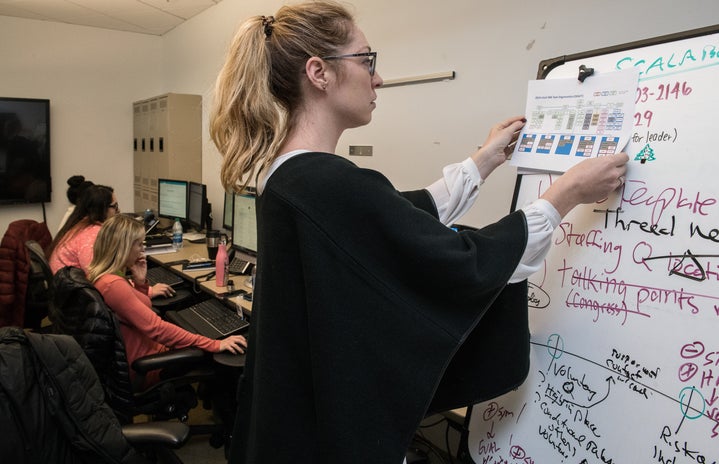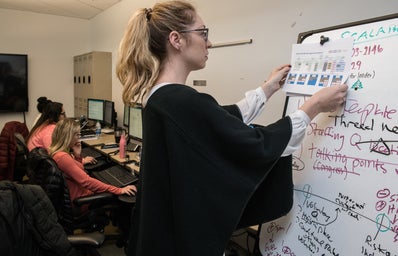Let me begin by saying that I am not a STEM person. I abandoned that dream when, halfway through my high school chemistry class, I realized that I kind of hated everything about studying for it. I could respect the usefulness of the scientific method from a distance, but I preferred to stay far away from anything the physical sciences might have had to offer me. I have stayed mostly in my humanities-and-social-sciences bubble since then.
Obviously, however, most liberal arts colleges will not let you leave without sampling a bit of every discipline, and the physical sciences were no exception to this rule. So when my school told me I needed to take two science classes, I (and I am ashamed to admit this) asked around about whatever the easiest options might be. This was when a friend of mine led me to astronomy.
I had avoided science classes for all of my senior year of high school and first year of college, and was ready for a bit of a rude awakening, but my fears were unfounded. Many introductory science classes are designed for people who are taking it as a requirement, and the professor of Astronomy 101 understood this. The class was beginner-friendly and interesting in a way that I had not expected. Many classes included use of visual aids using the school’s planetarium or other tools, and I consistently found my interest being drawn to whatever concept we were discussing.
What little I had learned about astronomy in middle and high school did not do much to engage my curiosity. I remember learning about the planets, the seasons, the compositions of different celestial objects, et cetera and so on. It was all very useful information, but it did very little to address the much more fascinating part of space: everything we do not yet know.
At some point in my education I developed a misconception. It was the notion that science is an infallible discipline, one that has unlocked all the answers to the questions of the universe. I was only ever taught what we already understood, and how we had come to understand it, and this made it difficult for me to imagine anything that we didn’t yet know.
But science is not some pure, unemotional pinnacle of logic and reason. It was a method built from humanity’s desire to understand the world around us. It requires that we make false assumptions and ask stupid questions in the pursuit of knowledge. I may not have perfectly understood everything I was taught in my astronomy class. Actually, I know for a fact that I didn’t. But what I do understand, and what I think was the most important lesson, is that we have so much more to learn. When we learn about science, it is not intended to be only a summary of our current understanding of the universe. It is a call to action. The most thrilling answer I could receive to a question I asked in class was, “we don’t know,” because that meant we still had the chance to find out.
night
My astronomy professor was not afraid to tell us how little we actually know about the universe that surrounds us and I am incredibly grateful for that. When we reached the end of our discussion about a topic, we would continue with the unanswered questions that astronomers are still asking. The Voyager space probe may have taught us a lot about the outer solar system, but what else could we learn if we sent out another mission to the outer planets? We know how to study celestial objects using light, but what about the objects that don’t interact with light at all–what we call dark matter? And perhaps the most interesting question of all, is there life on other planets? It has been months since the class concluded and I am still thinking about these questions now.
I think I understand now. The universe has awed me in countless ways since I started learning about it. One of these ways is the fortunate cosmic coincidence that our sun and moon happen to have similar angular diameters, allowing us to witness spectacular solar eclipses that expose the sun’s corona. Another is how different stars have different processes of birth and death, each breathtaking in their own way. Another is simply that Jupiter looks like a freshly poured cappuccino being orbited by its moon, Io, which looks like a moldy potato (this might be a more personal observation, but it is still a delightful one). I have found it impossible not to find joy in every corner of the universe that I have studied, whether by looking into the sky or reading about the theory of some celestial body’s origin.

I am not pursuing astronomy as a career, because learning chemistry and physics still sometimes makes me want to rip my hair out. However, I am excited to see what others can learn about it. I will be keeping as up-to-date as I can on current astronomical findings, because I can’t wait to see which questions we answer, and which new questions we come up with. And my reinvigorated scientific curiosity has another purpose as well, which I realized when I decided to declare my psychology major only a couple months ago. It was only this past semester, as I was taking my astronomy course, that I realized how much I wanted to do research on human thinking and behavior, another field in which we have many more questions than answers. I once heard it said that the human brain is “how the universe created a tool with which to know itself”–and I cannot help but be equally inspired by this mystery of the universe as I was by the larger-scale ones.
I am not writing this article because I want you to take Astronomy 101. This is not an advertisement, and I have no stake here. All I hope to do is inspire someone else to start learning more about a subject that they may once have been interested in, but have lost their passion for. Whatever may have drawn you away from it, whether that be how difficult it is to learn or the oppressive influence of some terrible teacher you may have had, I encourage you to start exploring it again. It’s okay if you’re not the best or the most knowledgeable. Learning for learning’s sake is worth it, and you never know where a new path may lead you.




